You are filling out your college form, then you pause as your fingers glides over the paper to the gap for choice career. "Mum what should I write as my first choice of course?" You asked. "Medicine!" your mum cries out from halfway down the corridor. "Like seriously? Civil engineering is definitely better." Your dad opines. You stare at both your parents, then back at your form. You have been in this dilemma before, stuck between two career choices that will determine your future - you fling your pen away and sit to think about your life.
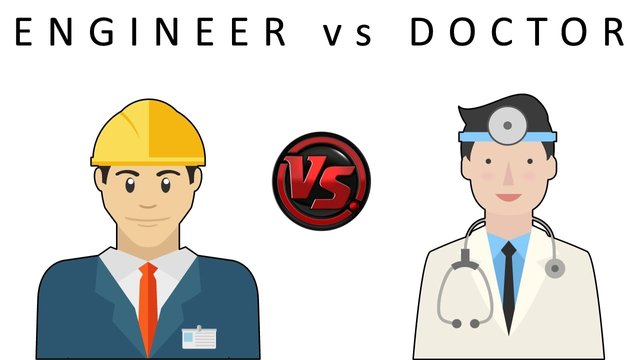
Photo Credit: YouTube
Our ability to survive on this earth for the time which we have lived is due to our variety of skills and attributes. As humans, we have the ability to make tools, structures and machines and to use our talents and creativity to enact a change in our environment.
Why Engineering? Why Medicine
The fields of engineering and medicine on a large scale are arguably the most popular science career choices of individuals. It all boils down to health or tech.
ENGINEERING: Design, Create and Build
Imagine the sense of fulfillment and accomplishment that Washington Roebling must have felt while walking the length of the world's largest suspension bridge in 1883. He must have felt extremely proud as he strode the 486 meter length of the Broklyn bridge, almost 15,000 tons of metal suspended between two massive towers.
The American Society for Engineering Education (ASEE) defines engineering as the art of applying scientific and mathematical principles, experience, judgement and common sense to make things that benefit people and the society. Technology can not do without engineering, hence they are interwoven.
Engineering involves identifying problems and finding solutions to them. Engineering and technology are part and parcel of our lives. Roads, bridges, structures and buildings, computers and machines are all products of the dexterity of engineers and their dedication to the prospect of making the world a better place.
Engineering is a broad field comprising of many specialized aspects such as civil engineering (construction of roads, bridges and buildings), computer engineering (creation and design of circuit boards, hardwares and anything computer related), mechanical engineering (design, creation and repair of machines in general), electrical and electronic engineering (dealing with electrical components, devices and electricity itself), chemical engineering (producing and researching on chemicals, plastics, petroleum, etc). Other fields include structural, software, electronic, petroleum, telecom and even medical engineering.
Every field of engineering is brain tasking, requires good mental and thinking capability as well as a good level of IQ. One of the tallest buildings in the world (the Burj Khalifa) is a product of structural and civil engineering, an imagination recreated in reality. Super computers that can process data billions of times per second are a product of advanced circuitry. The fastest jets which can move at speed of mach 3, 4 and above are a demonstration of what engineering brings to the world. On a smaller scale, our microwave at home, washing machines, gasoline generators, solar panels and in fact nearly everything that we use or touch in the 21st century is the product of tech oriented minds. Engineering is the life of the computer age, something we need and cannot do without.
MEDICINE: Saving Lives
The field of medicine is extremely broad and diverse, probably even wider then engineering itself. When talking of medicine, one refers to health safety and body well being. Medicine is a field of science involving the study, research and discovery of health problems, diseases, and drugs as well as identifying pathogens and finding solutions and cures to mitigate or eradicate these problems.
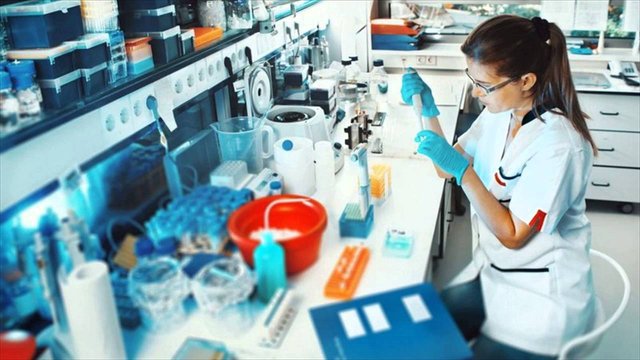
Photo Credit: YouTube
Medicine is widely the most appreciated field as it concerns what is more important than technology - LIFE. Humans as well as animal life and in some cases, plant life. Medicine requires passion requires passion and dedication especially when it concerns human health. Anyone going into the field of medicine should have great emotional and mental stability in order to manage and stress and death of patients.
Medicine comprises of pediatrics (treatment of teenagers), surgery (dissection and operations), obstetrics and gynaecology (women and their reproductive health), opthamology (eye and its diseases), veterinary(animal health), psychiatry (mental health). Others include oncology (cancer and tumors), optometry(bones).
Surgeons must be able to dedicate several hours worth of painstaking and totally undivided attention to a single operation. Emergency room physicians and medical personnel must take several life and death decisions daily.
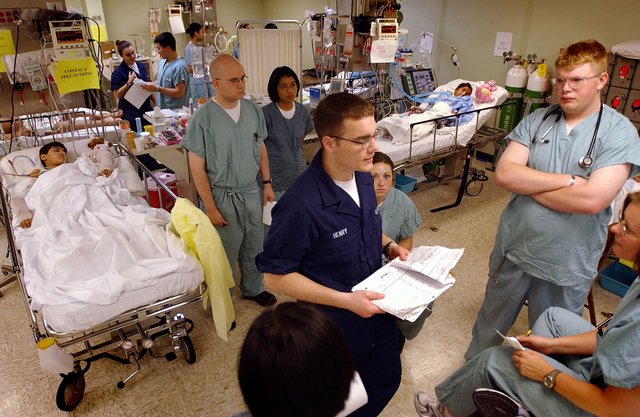
Photo Credit: Wikipedia - Clinical Engineerinng
People should indulge in medicine not for the sole purpose of making money, but for the passion of saving lives and ensuring survival. Veterinary doctors ensure that even the tiniest parrots live to see more days. The services rendered by doctors range from treating common colds to performing complex surgeries such as heart transplant and plastic surgery.
MEDICINE OR ENGINEERING: Differences
PAY: The average pay of a graduate of engineering who spends 4 or 5 years studying is roughly the same as a graduate of medicine who has spent 8 years of study, if not more. This is because it is easier to land a job immediately after graduation for a medical student than for a graduate engineer, it is not common to see someone who has studied medicine for two years less than a decade looking for a job. Unfortunately for engineers, after graduation, it may take years of experience to finally hit a gold mine of a job. This may be due to the fact that there aren't enough doctors in the medical field compared to the high number of engineers available for lesser job opportunities.
Even though an engineering graduate may earn slightly more than a medical graduate on the average, surgeons are an exception as they are the highest when it comes to pay.
Pay still varies though, as experience and level of qualification are the determining factors.
WINNER: DRAW
NOBILITY, RECOGNITION AND RESPECT
This is no argument as human life is just too important to be compared with tech. Besides, life came before man began using tools. Doctors are definitely more respected than nearly every other profession as they save lives, people and families are touched.
WINNER: MEDICINE
CHALLENGES AND DIFFICULTIES
College:
Getting into college is harder for medical "dreamers" than engineering "lovers" as the cut off mark for medicine even in my home country Nigeria is the highest of any profession. The life of a medical student is rough and tough as a lot of time and dedication is needed. Some medical students leave two or three years into the course, due to factors like the sight of blood and dead bodies, the smell of morgue and dissecting theatres and the amount of hard work involved.
For engineers though, getting into college is not as difficult as compared to medicine and the rest of college life is relatively smooth.
Work Life:
The amount of stress involved in the practice of medicine is overwhelming. Whether as a family physician, nurse, surgeon, or vet doctor, there are always patients waiting to be treated. Researchers and lab scientist are always awake looking for cures to diseases and for ways to develop better drugs. All these cause a lot of stress.
Unlike in medicine, engineers have particular working hours by which they comply, therefore they don't need to work outside the stipulated hours like doctors do.
WINNER: ENGINEERING
SOCIAL AND LIFE LEISURE
Due to the amount of time and dedication required of doctors, their attachment to their jobs and dedication to save lives, medical practitioners rarely have time for themselves, their families or loved ones as they(doctors) can be called at anytime of the day.
For engineers, lucky them. They are not as attached to to their jobs and therefore can spare some time for themselves. After all, you can't just suddenly rush to the office in the middle of the night because a customer called that his system got burnt.
PEOPLE WHO MADE IT
The biggest names, the most popular figures in the world consist of more engineers than doctors. The world's richest men comprise more of engineers than any other field, some of which are Mark Zuckerberg, Bill Gates, Larry Page, The Koch Brothers and Carlos Slim.

Photo Credit: Interesting Engineer
Notwithstanding though, medicine should not be left behind as it has also produced billionaires and famous people such as Ben Carson, Soon-Shlong and Gayle Cook.
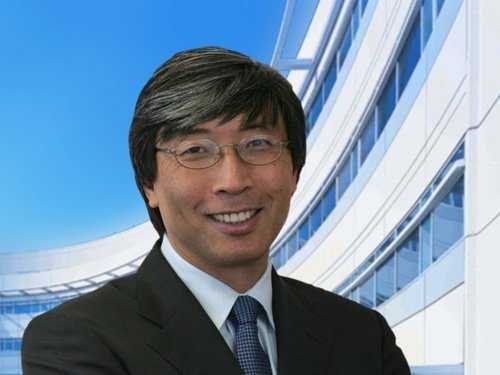
Photo Credit: Business Insider - The 10 Richest People In Medicine
WHICH AFFECTS OUR LIVES MOST?
Engineering plays an important role in nearly everything we use today. All around us, we see products of engineering - planes, cars, computers, bridges, roads, flyovers etc. It is a part of our society that we can't do without.
Hence, that does not mean medicine does not contribute as much. Infact, millions of people die everyday because of malaria. Without medicine, our cough and stomach aches won't be treated and epidemics would expand till the entire world is affected.
WINNER : DRAW
VERDICT:
Although engineering is the general winner here in my opinion, others may reject this views and thoughts or even add ways in which medicine is better. The importance of medicine cannot be overemphasized. Without life, engineering is useless as there would be no one to use tools or design and construct buildings.
Both fields offer the most wanted careers. Engineering is the reason for great advances in diagnosis and treatment of diseases (example, MRC Scans, X-rays, use of laser beams for treatment of eye disorders, etc). It provide technology to doctors technology that decades ago seemed like science fiction.
Medicine in the future is sure to change and advance in unimaginable ways as the use of nanotechnology will set in, but doctors won't stop using their abilities to care for their patients.
One thing should stick with you: Whether you are an engineer, a surgeon or doctor, desire to make an impact in the society to which you belong.
Both Medicine and Engineering are still under the auspices of science and they need each other to function effectively.
References:
- Nairaland
- Quora
- The New Book of Popular Science
- The Student Room
- Target Study
- College Confidential
- Student Caring
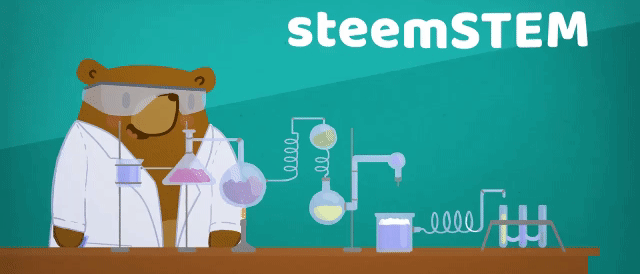

Hello, I finally found your account. How are you? Thanks for your help
Downvoting a post can decrease pending rewards and make it less visible. Common reasons:
Submit
Thank you too for checking up on me.
Downvoting a post can decrease pending rewards and make it less visible. Common reasons:
Submit
It's interesting how you broke down these professions into different classes...
In my opinion, I think the engineers are have the operation hand. The doctors depend on gadgets invented by the engineers, and even so many medical break through are as a result of scientific / engineering discover e.g chemotherapy...
Thanks for sharing @casweeney
Downvoting a post can decrease pending rewards and make it less visible. Common reasons:
Submit
You got the gist. That's what I was explaining.
Downvoting a post can decrease pending rewards and make it less visible. Common reasons:
Submit
This is so captivating. That you broke the argument in sections with corresponding points makes it more interesting.
Aside the registered support for engineering - being a graduate of the profession myself, I support @korexe view that Engineers are the creator while Doctors are users. However, doctors keeps us fit to continue more work and unlocking greater feats.
But as earlier said, engineers rule the world.
Downvoting a post can decrease pending rewards and make it less visible. Common reasons:
Submit
Very true, but it is not fair how engineers suffer in terms of job. Unlike medical practitioners who don't have to waste much time searching for job.
Downvoting a post can decrease pending rewards and make it less visible. Common reasons:
Submit
When choosing between engineering and medicine, students often weigh the impact of each field. Engineering offers a path to innovation and problem-solving, while medicine focuses on improving human health. Both are essential, but their needs differ. Engineering drives technological advances, while medicine addresses immediate health concerns. For example, in medical fields, treatments like the use of zo growth factor serum before and after highlight advancements in skincare. Ultimately, both disciplines contribute significantly to societal progress and should be considered based on individual interests and career goals.
Downvoting a post can decrease pending rewards and make it less visible. Common reasons:
Submit